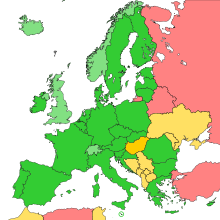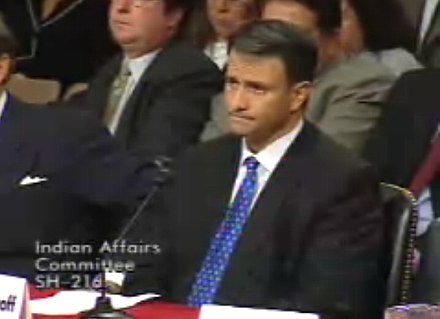Portal:Politics
 | Portal maintenance status: (June 2018)
|
| Main | Topics and categories | Tasks and projects |
The Politics portal
Politics (from Ancient Greek πολιτικά (politiká) 'affairs of the cities') is the set of activities that are associated with making decisions in groups, or other forms of power relations among individuals, such as the distribution of status or resources. The branch of social science that studies politics and government is referred to as political science.
Politics may be used positively in the context of a "political solution" which is compromising and non-violent, or descriptively as "the art or science of government", but the word often also carries a negative connotation. The concept has been defined in various ways, and different approaches have fundamentally differing views on whether it should be used extensively or in a limited way, empirically or normatively, and on whether conflict or co-operation is more essential to it.
A variety of methods are deployed in politics, which include promoting one's own political views among people, negotiation with other political subjects, making laws, and exercising internal and external force, including warfare against adversaries. Politics is exercised on a wide range of social levels, from clans and tribes of traditional societies, through modern local governments, companies and institutions up to sovereign states, to the international level.
In modern nation states, people often form political parties to represent their ideas. Members of a party often agree to take the same position on many issues and agree to support the same changes to law and the same leaders. An election is usually a competition between different parties.
A political system is a framework which defines acceptable political methods within a society. The history of political thought can be traced back to early antiquity, with seminal works such as Plato's Republic, Aristotle's Politics, Confucius's political manuscripts and Chanakya's Arthashastra. (Full article...)
Selected article
The College Republican National Committee is a national organization for college and university students who support the Republican Party of the United States. The organization is known as an active recruiting tool for the Republican Party and has produced many prominent Republican and conservative activists and introduced more party members to the Republican party than any other organization in the nation. The College Republicans were founded as the American Republican College League on May 17, 1892, at the University of Michigan. The organization was spear-headed by law student James Francis Burke, who would later serve as a Congressman from Pennsylvania. The inaugural meeting was attended by over 1,000 students from across the county, from Stanford University in the west to Harvard University in the east. Contemporary politicians also attended the meeting, including Judge John M. Thurston, Senator Russell A. Alger, Congressman J. Sloat Fassett, Congressman W. E. Mason, John M. Langston, and Abraham Lincoln's successor in the Illinois State Legislature, A. J. Lester. Then-Governor of Ohio William McKinley gave a rousing keynote speech.
Featured picture

Photo taken by a Lockheed U-2 spy plane of the San Cristobal MRBM launch site in Cuba, November 1962, after the Cuban Missile Crisis. Although this image was taken days after the crisis had ended (October 28), this image has become iconic of the crisis to the point where it is often cited incorrectly as having been taken during the crisis.
Selected quote
Selected biography
José Paranhos, Viscount of Rio Branco (1819–1880) was a politician, monarchist, diplomat, teacher and journalist of the Empire of Brazil. In 1871, Rio Branco became the President of the Council of Ministers (Prime Minister) for the first time. He would become the Council's longest-serving president, and his cabinet the second longest, in Brazilian history. His government was marked by a time of economic prosperity and the enactment of several necessary reforms—though they proved to be seriously flawed. The most important of these initiatives was the Law of Free Birth, which granted freeborn status to children born to slave women. Rio Branco led the government that enacted this law, and its passage increased his popularity. However, his government was plagued by a long crisis with the Catholic Church that had resulted from the expulsion of Freemasons from its lay brotherhoods. After more than four years heading the Cabinet, Rio Branco resigned in 1875. Following a long vacation in Europe, his health swiftly declined and he was diagnosed with oral cancer. Rio Branco died in 1880 and was widely mourned throughout the country. He is regarded by most historians as one of Brazil's greatest statesmen.
Did you know (auto-generated) -

- ... that prior to entering politics, Herbert Salvatierra led a troupe of carnival comparsas?
- ... that political philosophy professor Werner J. Dannhauser was the basis for a character in a Saul Bellow novel?
- ... that as part of its strategy of political renovation, National Convergence nominated a librarian to contest one of Bolivia's most competitive legislative districts?
- ... that an excavation for 75 Wall Street revealed an old crock linked with a leader of the Tammany Hall political machine?
- ... that after its merger with India, the last raja of Jubbal State joined the Indian Foreign Service?
- ... that even though the Legislative Assembly of Quebec ordered a monument of Maurice Duplessis in front of its building, later premiers hid it for 16 years to avoid political tensions?
More did you know...
- ...that the 2010 Bihar legislative assembly election takes place across six phases and over one month?
- ...that, at a congress in May 1921, all Socialist Party of Romania delegates who supported Bolshevik guidelines were arrested 24 hours after a vote on affiliation to the Comintern?
- ...that Ngo Dinh Diem became president of South Vietnam after a fraudulent 1955 election run by his brother Ngo Dinh Nhu, polling 133% of registered voters in Saigon?
- ...that the Brothers Grimm were amongst the Göttingen Seven, university teachers who protested changes to the constitution of the Kingdom of Hanover in 1837?
- ...that the UK's Workers Socialist Federation began as a suffragette group?
- ...that during the Sixth Congress of the Cuban Communist Party, Raúl Castro proposed term limits for the country's leaders?
In this month
- October 1, 1949 – The People's Republic of China is officially proclaimed.
- October 1, 1982 – Helmut Kohl, described as "the greatest European leader of the second half of the 20th century" by George H. W. Bush and Bill Clinton, is elected Chancellor of Germany.
- October 4, 1849 – Official founding of the Colombian Conservative Party.
- October 7, 1949 – The Democratic Republic of Germany DDR is established officially.
- October 7, 2003 – Voters recall Governor Gray Davis from office and elect actor Arnold Schwarzenegger to succeed him.
- October 10, 1911 – The Wuchang Uprising starts the Xinhai Revolution that leads to the founding of the Republic of China.
- October 10, 1919 – The Kuomintang of China was founded.
- October 27, 2005 – The political establishment in France is rocked by the spread of rioting among poor immigrant communities in suburbs of the major cities.
News and Current events
- August 11: 4 local government areas in New South Wales, Australia locked down after COVID-19 case
- August 11: Australia: AstraZeneca vaccine access expanded by Victorian government
- August 1: Australia: Victorian lockdown lifted
- July 29: Tunisia's president dismisses prime minister, suspends parliament
- July 25: Australia: Wikinews interviews Reg Kidd, mayor of the City of Orange, about COVID-19 lockdown and local government
- July 23: South Australia enters week-long lockdown to contain COVID-19 Delta variant spread
- July 21: Technological University Dublin senior lecturer Dr Lorcan Sirr speaks to Wikinews on housing market in Ireland
- July 21: Three rural councils in New South Wales, Australia enter 7-day lockdown
- July 21: Australia: Victoria lockdown extended by a week with 85 active cases recorded
- July 15: California governor signs new state budget, eligible Californians to get stimulus payments
Topics and categories
General images
Related portals
Associated Wikimedia
The following Wikimedia Foundation sister projects provide more on this subject:
- Commons
Free media repository - Wikibooks
Free textbooks and manuals - Wikidata
Free knowledge base - Wikinews
Free-content news - Wikiquote
Collection of quotations - Wikisource
Free-content library - Wikiversity
Free learning tools - Wiktionary
Dictionary and thesaurus



.jpg/440px-Recollections_of_Full_Years_(Helen_Taft).jpg)















_(2).jpg/440px--FsA14_-_Freiheit_statt_Angst_062_(14898357029)_(2).jpg)















.jpg/440px-Warren_Medicare_for_All_(36492682584).jpg)















2.JPG/440px-GenocidePortalLogo(ESR)2.JPG)






















